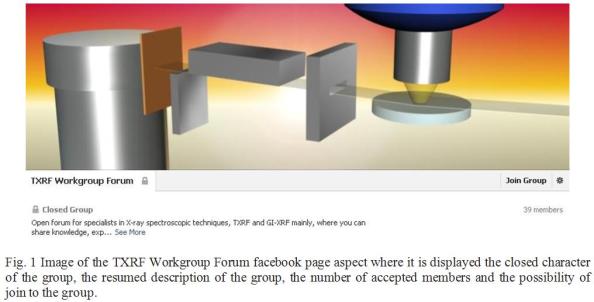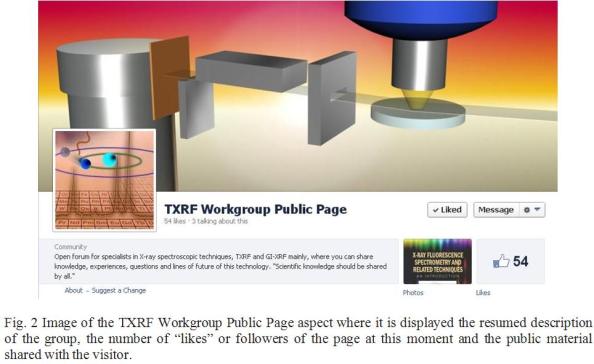TXRF Workgroup and Social Networks: An alternative tool for scientific collaboration

Hola a todos de nuevo, con este nuevo artículo quiero compartir con vosotros el Abstract Extendido que acabo de enviar a la «15th International Conference on TXRF and Related Methods» que se celebrará del 23 al 27 de Septiembre de 2013 en Osaka, Japón. He tenido el inmenso honor de ser amablemente invitado a dar una charla en dicha conferencia, gracias al criterio de su comité científico y particularmente al del Prof. Kouichi Tsuji, Co-Chair del congreso. Para mi fue una muy grata sorpresa recibir la invitación y agradezco sinceramente la oportunidad que me brindan. El tema en el que estaban interesados que hablase se aleja un poco de mi «carrera científica» en el área de la TXRF lo que en un principio me descentro un poco, pero al poco tiempo asumí su propuesta. Su idea era que presentase la idea del TXRF Workgroup en facebook. Este proyecto la arranque, sin muchas pretensiones, hace menos de un año y, a día de hoy, somos ya 39 miembros de todo el mundo en el foro y 55 seguidores en su página pública. Mi idea en este congreso es intentar presentar las bases y estructura básica sobre la que se ha construido este proyecto a la mejor audiencia posible en este área, la que brinda la TXRF2013 Conference.
TXRF Workgroup and Social Networks: An alternative tool for scientific collaboration
Ramón Fernández-Ruiz
Servicio Interdepartamental de Investigación. Laboratorio de TXRF. Universidad Autónoma de Madrid. 28049, Madrid, Spain.
1. Introduction
This work presents, for first time, the origin, motivations and reasons to be of the, recently created, TXRF Workgroup to the international community of Total-reflection X-Ray Fluorescence and Related Methods. The origin of the TXRF Workgroup can be found in the simple idea of trying to put in contact those colleagues with common interest in the field of TXRF in particular and XRS in general. The main motivation for the creation of this Workgroup was to facilitate the collaboration between researchers in these scientific and technological areas around the world in an easy way. As technological novelty, the TXRF Workgroup uses the Social Networks, each time more presents in our lives, as the alternative tool for the scientific communication, interrelation and collaboration. In particular, facebook was the social network used due, mainly, to its near 1000 millions of users around the world and its facility of use. These new technologies of information, made available to all of us, through our computers, smart-phones, tablets etc, to be in contact anywhere and at any time which allow us to interact with the group members wherever they are around the world. The TXRF Workgroup is an open discussion forum where all people are welcome independent of its formation or its technological or scientific recourses. Only one condition is required to be part of the group as member, the clear interest by the TXRF-XRS knowledge area. The main motto of the TXRF Workgroup is «Scientific knowledge should be shared by all». For this reason, future members, with a public and contrasted scientific relation in the XRS field, will be welcome and very appreciates in the TXRF Workgroup. One of the basic principles of the group is that when larger be the diversity of the members, higher will be the flux of ideas between the members and, as a natural consequence, more easily should be the generation of new knowledge, which ultimately is the reason to be of the TXRF Workgroup.
2. TXRF Workgroup Description
The description that appears in the main facebook page of the workgroup is as follow: “Open forum for specialists in X-ray spectroscopic techniques, TXRF and GI-XRF mainly, where you can share knowledge, experiences, questions and lines of future of this technology. Scientific knowledge should be shared by all». In this way, two main pages constitute the TXRF Workgroup platform, both located in the facebook environment.
First, the named “TXRF Workgroup Forum” (http://www.facebook.com/groups/TXRFSpectrometry) (see Fig. 1) which is a restricted facebook group where all the members are accepted by the group administrator with a previous and simple verification of its real interest to participate in the group. In this case, only the accepted members have access to participate actively in the opened discussions or, why not, to open new discussion lines. The people that come at TXRF Workgroup Forum page but they have not yet been accepted as members only can to see the description of the group and the members belonging to the group but, in any case, they do not can access to the information shared within the group.

In a parallel way, it exist a second facebook page named “TXRF Workgroup Public Page” (http://www.facebook.com/TXRFSpectrometry) (see Fig. 2) which is the public image of the restricted workgroup forum. In contrast to the forum page, in this case, anyone can access to published information on it, regardless of it being member or not. The purpose of this page is to become the place where anyone can find out about the activities, news, events etc. related with the TXRF Workgroup with a public character.
3. Outlooks
After about a year since the TXRF Workgroup began to walk slowly, we are 39 members in the Forum and 54 followers of the Public Page of the group. The numbers are continuously increasing even considering the afraid, fears and lack of confidence that global social networks offer at all. In any case, the TXRF Workgroup is allowing that technician, professors, PhD students, researchers of private companies, commercials related with XRS, engineers or scientists around the world (Spain, Germany, Austria, Argentina, Hungary, France, Sweden, Netherlands, Sri Lanka, Kenya, Italy, Japan, Albania, Belgium, Brazil and Russia, at the moment) can interact constructively and share their knowledge, instrumental and technological resources with the aim of break with the limitations that we, or the external circumstances, impose us. As consequence and in theory, we can try to develop our “ideas” with the help of experimented experts in this knowledge area and, also the best instrumentation to solve the questions related with the scientific problem arising by this “idea” and, more important, all this independent of our local resources. An important related question is: what happens with the new knowledge generated?. In this sense, the ethical guidelines of the workgroup try to apply the common sense, professionalism, scientific quality and honesty of each one of the group members. So, the main system of control over this “new knowledge” is the same group members.
As resume, the TXRF Workgroup has been created, the number of members is increasing and the first steps are being given carefully. In any case, the outlooks are promising and only depend of ourselves.
Dr. Ramón Fernández Ruiz

